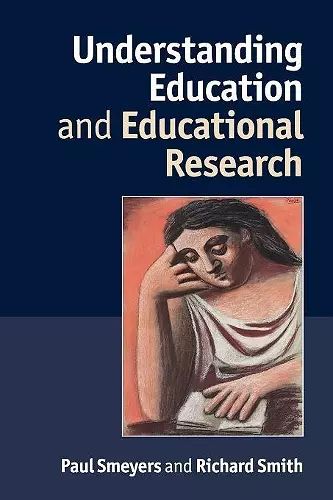Understanding Education and Educational Research
Richard Smith author Paul Smeyers author
Format:Paperback
Publisher:Cambridge University Press
Published:10th Nov '14
Currently unavailable, and unfortunately no date known when it will be back
This paperback is available in another edition too:
- Hardback£58.00(9781107009202)

Argues that good educational research is often in essence philosophical rather than a matter of conventional 'research methods'.
Educational research is widely believed to be essentially empirical, consisting of research techniques such as statistics, interviewing, or randomised control trials. This book argues that good research in education needs the rigorous thinking characteristic of philosophy, and that philosophical treatments themselves sometimes constitute such research.Educational research is widely believed to be essentially empirical, consisting mainly of collecting and analysing data, with randomised control trials as the 'gold standard'. This book argues that good educational research is often philosophical in nature. Offering a critical overview of the current state of educational research, the authors argue that there are two factors in particular that distort it. One is that throughout the world it is expected to serve the interests of the state in securing educational improvements, as measured by standardised examination results, and to demonstrate 'scientific' credentials sufficient to guarantee absence of ideological bias and carry conviction. The other is that learning to do educational research is generally seen as a matter of being trained in empirical 'research methods'. The authors demonstrate, by contrast, that good educational research needs the rigorous thinking characteristic of philosophy, and that philosophical treatments themselves sometimes constitute such research.
'Smeyers and Smith have produced a coherent collection of papers that provide a healthy antidote to many of the cliche ridden discourses that are increasingly dominating the theory and practices of educational research - the inappropriate and uncritical aping of scientific method as a vehicle for educational inquiry and the assumption that only this will contribute to rigorous educational inquiry ('scientism'); the insistence on quantifying the unquantifiable ('metricophilia' is the new perversion) and the marginalising of modes of understanding, discernment and appreciation rooted in literature, history, social anthropology and philosophy. The critique of educational research is not directed against its uselessness but against its failure to grasp the stuff of humanity that it is dealing with and to acknowledge the sources that have a continuing capacity to illuminate this experience. It is an antidote that should be taken preventatively by all students and, if it is not too late, as curative medicine by all those that are teaching them 'research methods'.' David Bridges, Emeritus Professor, University of East Anglia; and Director of Research, University of Cambridge Faculty of Education
'We seem to have entered a new dim age, a murky mix of scientism and managerialism in which accountability is reduced to accounting, judgment replaced by rubrics, and science parodied as a cultic religion of methods and statistics. In such an age, one needs guides such as Smeyers and Smith who, with their perfect blend of philosophical erudition and common sense, show how the craze for 'what works' distracts us from the crucial question of what matters in education, how the search for genuine understanding gets left behind in the contemporary parade of flimsy correlations, sloppy conceptualizations, and pseudo-generalizations.' Chris Higgins, University of Illinois, Urbana-Champaign
ISBN: 9781107401617
Dimensions: 227mm x 150mm x 15mm
Weight: 330g
227 pages